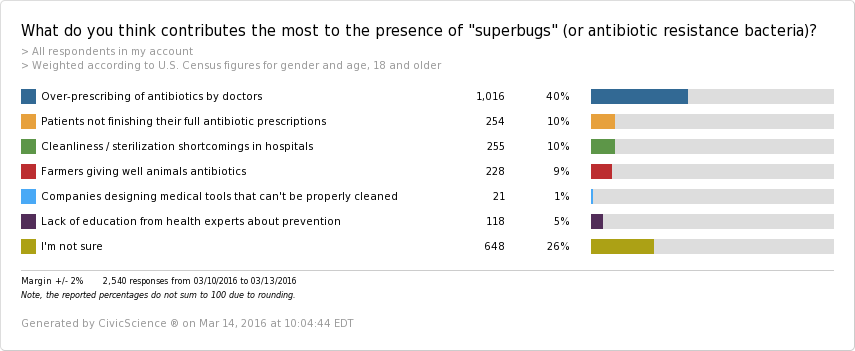People are more prone to blame their doctors than to blame each other when it comes to the rise of superbugs in the US. However, given the increasing consumerism in medicine – ads directed to patients, the rise of express care facilities that give medical care a fast-food feel – consumers may be at fault too.
Every year, about 2 million people get sick from an antibiotic-resistant bacteria, according to the CDC. So where do consumers believe the focus should be applied in addressing the problem?
We asked over 2,500 adult consumers, “What do you think contributes the most to the presence of “superbugs” (or antibiotic resistance bacteria)?” The following results emerged:

“Over-prescribing of antibiotics by doctors” is the most popular answer choice with 40% of the responses. College graduates are more likely to choose this answer. Experts have indicated that the more antibiotics you take, the more at-risk you are of getting sick with a superbug. So many consumers are informed on the matter.
Although doctors are at fault for over-prescribing antibiotics, so are patients to some extent. There has been an increasing trend, in which patients think of themselves as customers, demanding or asking for certain things. How many times have you heard a friend or family member say, “This is a pretty bad cold, so I’ll just have my doctor call in an antibiotic?”
10% of adults believe not finishing prescriptions contributes to the drug-resistant bacteria and another 10% believe a lack of cleanliness/sterilization in hospitals contributes to superbugs. Here’s a quick look at who was more likely to choose those answer choices:
- Grandparents and women are morelikely to pinpoint hospitals as an area of concern.
- Those living in the US West and those who are 18-34 years old are more likely than others to answer “Patients not finishing their full antibiotic prescriptions.”
A Need for More Research and Education
Consumer opinion on this topic betrays a need for education and public awareness. People feel that such campaigns aren’t needed. Only 5% of people thought the health issue was most linked to a lack of education from experts.
The superbug problem seems to be linked to many causes at once, which might explain why 26% of adults chose the answer choice “I’m not sure.” But if so many of us are unsure about what contributes to the drug-resistant bacteria, why aren’t more people concerned about a lack of education? One thing is for sure, preventative steps are greatly needed in order to fight the looming superbug threat.








